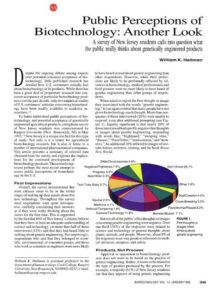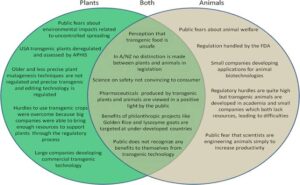Back to: Botany 400 Level
Welcome back, amazing Afrilearn scholar! Today, we’re going to explore a topic that’s not just about science and technology, but also about how people, including farmers, consumers, and society, view biotechnology. We’ll be looking at public perception and acceptance of biotechnology—how the world sees it, the fears, the hopes, and how all this shapes what happens next in agricultural development. Let’s dive in!
Public perception and acceptance of biotechnology
Imagine this: a new GM (genetically modified) crop is introduced in Nigeria that promises to solve food security issues, help with drought resistance, and increase yields. Sounds great, right? But, not everyone might be so quick to embrace it. Some people might be excited, while others might be fearful or sceptical. This is where public perception comes in.

Public perception refers to the way people feel or think about something. Acceptance, on the other hand, is when people agree to accept or approve of a new idea or technology. In the case of biotechnology, it’s important to understand why some people are enthusiastic about GM crops, while others are hesitant or even opposed.
Factors Influencing Public Perception and Acceptance
- Knowledge and Education
In many places, the more people know about biotechnology and its benefits, the more likely they are to accept it. However, when people don’t understand how things work—like GM crops—fear and misinformation can quickly take hold. This is why education is so important in helping the public understand the science behind biotechnology.
- Example: In Nigeria, if local farmers understand how GM cassava can resist disease and improve yields, they might be more willing to adopt it. But if they don’t understand the science, they might fear it will harm their crops or environment.
- Example: In Nigeria, if local farmers understand how GM cassava can resist disease and improve yields, they might be more willing to adopt it. But if they don’t understand the science, they might fear it will harm their crops or environment.
- Cultural Beliefs and Values
Cultural beliefs play a big role in how new technologies are accepted. In many African communities, farming has deep cultural significance. People may feel that introducing GM crops could undermine traditional farming practices or the cultural identity tied to native crops.
- Example: Some Nigerian farmers may prefer to grow local varieties of crops like maize or yam because they have been passed down for generations, and they trust them. Introducing GM versions might seem like a threat to these traditions.
- Example: Some Nigerian farmers may prefer to grow local varieties of crops like maize or yam because they have been passed down for generations, and they trust them. Introducing GM versions might seem like a threat to these traditions.
- Media Influence
The media is powerful in shaping public opinions. Positive media coverage of biotechnology, such as highlighting its potential to solve hunger or increase crop resilience, can sway public opinion in favour of GM crops. On the other hand, negative coverage focusing on potential risks or failures can cause fear and rejection. - Example: News about a successful GM crop that increases food security in another African country may spark interest and support. But if the media reports on a failure or environmental concern related to GM crops, people may start questioning their safety.
- Example: News about a successful GM crop that increases food security in another African country may spark interest and support. But if the media reports on a failure or environmental concern related to GM crops, people may start questioning their safety.
- Environmental Concerns
Many people worry about the environmental impact of GM crops, fearing they might harm biodiversity or create superweeds (weeds resistant to herbicides). These concerns can create fear and pushback against GM crops, especially among those who value environmental conservation.
- Example: If a local community hears that GM maize might cross-pollinate with native maize and affect the ecosystem, they might hesitate to adopt it. This fear of environmental harm can be a strong barrier to acceptance.
- Example: If a local community hears that GM maize might cross-pollinate with native maize and affect the ecosystem, they might hesitate to adopt it. This fear of environmental harm can be a strong barrier to acceptance.
- Trust in Regulatory Bodies and Science
Trust in the institutions regulating GM crops, such as government bodies or scientific organisations, can greatly influence public opinion. If people trust that these institutions are doing thorough testing and ensuring safety, they are more likely to accept biotechnology. But if there’s a lack of trust or concerns about corruption or corporate influence, people may reject it.
- Example: In Nigeria, the National Biotechnology Development Agency (NABDA) plays a key role in educating the public and regulating biotechnology. If farmers and consumers trust NABDA’s assessments, they will be more likely to accept GM crops.
- Example: In Nigeria, the National Biotechnology Development Agency (NABDA) plays a key role in educating the public and regulating biotechnology. If farmers and consumers trust NABDA’s assessments, they will be more likely to accept GM crops.

Examples of Public Perception Around the World
- In the U.S. and Brazil, many farmers have embraced GM crops like Bt cotton and Roundup Ready soybeans, believing that they improve yields and reduce pesticide use. In these countries, public acceptance is high.
- In Europe, however, public perception of GMOs is more cautious, with many people concerned about the long-term health and environmental effects. Countries like France and Germany have strict regulations on GM crops, reflecting a more sceptical attitude towards biotechnology.
- In Africa, acceptance varies from country to country. South Africa has been a leader in adopting GM crops, but in countries like Kenya and Zambia, there is more resistance due to concerns over safety and cultural beliefs.
Why Public Perception and Acceptance Matter
- Market Adoption: If the public doesn’t accept GM crops, farmers may be less likely to plant them. Consumer rejection can also affect market demand, especially in places where consumers are wary of GM foods.
- Policy and Regulation: Public perception influences the policies and regulations that governments create around biotechnology. If people demand stricter regulations, governments may impose bans or limitations on GM crops.
- Global Trade: Countries that embrace GM crops may face trade challenges with countries that ban or restrict GM products. Public perception plays a role in shaping these international relationships.

Summary
- Public perception of biotechnology, especially GM crops, is shaped by factors like education, cultural beliefs, media, environmental concerns, and trust in regulators.
- Countries and regions vary in their acceptance of GM crops, with some welcoming the technology and others remaining cautious or opposed.
- It’s crucial to address concerns through education, transparent regulation, and open dialogue to foster acceptance and trust.
Evaluation
- How does media influence public perception of biotechnology?
- Why is education important in changing people’s views on GM crops?
- What role does cultural belief play in the acceptance of GM crops in Nigeria?
You’re not just learning about biotechnology—you’re learning how it fits into the real world, with all its complexities and challenges. You’re developing the knowledge to shape the future of agriculture and science in your community. Keep questioning, keep learning, and most importantly, stay curious! With Afrilearn, you’re becoming a thoughtful and powerful agent of change. Let’s keep moving forward together!
